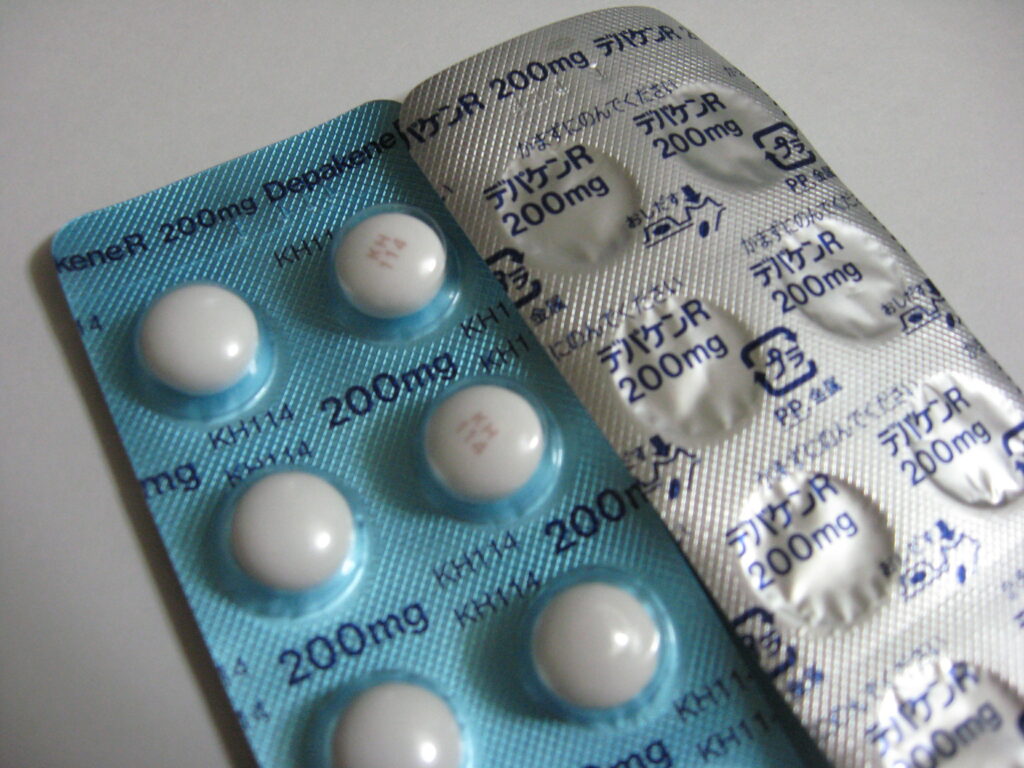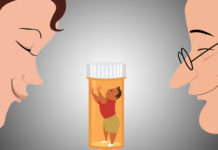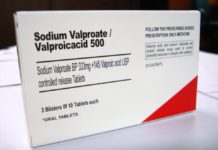A new French study has confirmed the risks associated with valproate, an anticonvulsant used to treat seizures, Bipolar Disorder, and sometimes migraines and chronic pain. France’s National Agency for the Safety of Medicines (ANSM) reports an estimated 2,150 to 4,100 children have suffered severe congenital disabilities as a result of this drug. Now, families are demanding answers and reconciliation for the damage caused by valproate since its introduction on the French market in 1967. Gerard Bapt, ANSM official, stated the following:
“It now appears fundamental that valproate in all its forms should not be prescribed for women of child-bearing age.”

Valproate has been widely prescribed in France, the UK, the United States, and many other countries, under various names including Epilim, Depakine, Depakote, and Stavzor. Since its release in 1967, between 64,100 and 100,000 pregnant mothers were exposed to the drug in France. Information surrounding the adverse effects of valproate emerged in the 1980s when concerns focused specifically on spina bifida, a condition in which the baby’s spinal cord fails to develop properly.
Recently, the ANSM published a report drawing from national, interregional health insurance data (SNIIRAM) on the risk of major congenital malformations. Findings indicated that women exposed to the drug for epilepsy treatment were four times more likely to give birth to children with birth defects, including spina bifida and additional defects of the heart and genital organs. Women being treated for Bipolar Disorder were twice as likely, a difference explained by varying exposure to the drug—doctors stopped valproate treatment earlier on in the pregnancy of women diagnosed with Bipolar Disorder.
“The study confirms the highly teratogenic [capable of causing birth defects] nature of valproate,” states one co-author.
While up to 4,100 children are estimated to suffer from congenital malformations, evidence from this study also suggests that exposure to valproate in utero may be linked to a higher risk of developing neurodevelopmental disorders. An exploratory follow-up study, set to be published later this year, continues to investigate this finding.
Doctors in France are now cautioned against prescribing this drug to girls, women of childbearing age, and pregnant women. The National Health Service (NHS) of the UK recently published an alert, warning of the “very high risks to the unborn child of valproate in pregnancy.” They cite that 30-40% of unborn babies exposed to valproate are at high risk of neurodevelopmental disabilities, including lower intelligence and autism spectrum disorders, and that 10% are at risk of other birth defects.
According to the NHS, a survey conducted this past month found that out of a sample of 624 women taking valproate, 20% were unaware of the risks associated with the drug, and even fewer were given the appropriate educational materials.
A number of French families have come together, joining an association known as APESAC, to sue Sanofi, valproate’s manufacturer. Many identify as one of the 30,000 to 50,000 estimated families and children victimized by valproate, who did not receive adequate warning of the drug’s risks. If the knowledge that spina bifida results from in utero exposure was present as early as the 1980s, then why has it taken so long for authorities to address these severe risks and modify prescription guidelines?
According to a BBC News report, Sanofi issued a response claiming that it had been “totally transparent with health authorities.” They wrote:
“We are aware of the painful situation confronting the families of children showing difficulties that may have a link with the anti-epileptic treatment of their mother during pregnancy.”
APESAC President, Marine Martin says she is one such victim of valproate. As a result of taking the drug during her pregnancies, two of her children suffered physical defects.
“The number of victims is potentially huge,” she told reporters at Agence France-Presse (AFP). “We need to take into account children with malformations and autism, as well as families that lost a baby due to treatment during pregnancy.”
****
Read the original report here: http://ansm.sante.fr/S-informer/Actualite/Malformations-congenitales-chez-les-enfants-exposes-in-utero-au-valproate-et-aux-autres-traitements-de-l-epilepsie-et-des-troubles-bipolaires-Communique















Another crime against humanity by the psychiatric industry. I know how this story ends,
10. When the lawsuits roll in from the families of sick and dead patients, simply use a small portion of your windfall profits to settle out of court, admitting no guilt.
See 1-9 http://www.naturalnews.com/disease-mongering-engine.asp Click Generate
Until number 10 changes to corporate psychopaths go to prison we will continue to see these stories over and over again.
Report comment
And prescribers actually believe this awful drug is a “mood stabilizer”. Who has the delusions?
How many who are injured by valproate and who suffer terribly from its side effects, were coerced or forced to take this drug for a misdiagnosis of “pseudo-bipolar disorder” because their SSRI-ADRs were unrecognised and misdiagnosed as “first episode psychosis”?
Then add risperidone!
Crimes against humanity indeed.
TRM 123. Retired Physician
Report comment
Thanks for reporting this, I was prescribed this drug for an iatrogenic case of “bipolar,” so did some research into this drug, and it is problematic. First, I will point out that dosing differences between Depakote and Depakote ER make it very easy for the doctors to massively, accidentally over-prescribe. And if you think doctors always differentiate accurately between Depakote and Depakote ER in their medical records you are likely wrong, since I’m not dead yet. Second, Depakote is NOT recommended for long term use, and the psychiatrists believe all the drugs they give for their made-up DSM disorders should be given for life. Third, here is the adverse drug effect profile of Depakote from drugs.com:
Gastrointestinal
Very common (10% or more): Abdominal pain, diarrhea, dyspepsia, gingival disorder, nausea, vomiting
Common (1% to 10%): Constipation, dry mouth, eructation, fecal incontinence, flatulence, gastralgia, gastroenteritis, glossitis, periodontal abscess, hematemesis, stomatitis
Uncommon (0.1% to 1%): Pancreatitis (life-threatening)[Ref]
Hepatic
Common (1% to 10%): Increased liver enzymes (particularly early in treatment), liver injury, SGOT increased, SGPT increased
Frequency not reported: Severe liver damage (including hepatic failure sometimes resulting in death), increased serum bilirubin, abnormal changes in other liver function tests[Ref]
Nervous system
Very common (10% or more): Dizziness, headache, somnolence, tremor
Common (1% to 10%): Abnormal gait, amnesia, catatonic reaction, convulsion, disturbance in attention, dysarthria, extrapyramidal disorder, hypertonia, hypokinesia, incoordination, increased reflexes, memory impairment, nystagmus, paresthesia, speech disorder, stupor, tardive dyskinesia, taste perversion
Uncommon (0.1% to 1%): Ataxia, coma, encephalopathy, lethargy, reversible Parkinsonism
Rare (less than 0.1%): Cognitive disorder, reversible dementia associated with reversible cerebral atrophy
Frequency not reported: Cerebral atrophy, dementia[Ref]
Hematologic
Very common (10% or more): Thrombocytopenia
Common (1% to 10%): Anemia, hemorrhage
Uncommon (0.1% to 1%): Leucopenia, pancytopenia
Rare (less than 0.1%): Abnormal coagulation tests (e.g., prolonged prothrombin time, prolonged activated partial thromboplastin time, prolonged thrombin time, prolonged INR), agranulocytosis, bone marrow failure, decreased coagulation factors, including pure red cell aplasia, macrocytosis
Frequency not reported: Aplastic anemia, bone marrow suppression, bruising, eosinophilia, frank hemorrhage, hypofibrinogenemia, anemia including macrocytic with or without folate deficiency, relative lymphocytosis[Ref]
Respiratory
Very common (10% or more): Flu syndrome, respiratory infection
Common (1% to 10%): Bronchitis, dyspnea, epistaxis, increased cough, pharyngitis, pneumonia, rhinitis, sinusitis
Uncommon (0.1% to 1%): Pleural effusion[Ref]
Renal
Rare (less than 0.1%): Reversible Fanconi’s syndrome, tubulointerstitial nephritis[Ref]
Cardiovascular
Common (1% to 10%): Edema, hypertension, hypotension, palpitations, postural hypotension, peripheral edema, tachycardia, vasodilation
Frequency not reported: Bradycardia, cutaneous vasculitis, hematoma formation[Ref]
Endocrine
Uncommon (0.1% to 1%): Hyperandrogenism, syndrome of inappropriate ADH secretion
Rare (less than 0.1%): Hypothyroidism
Frequency not reported: Abnormal thyroid function tests, elevated serum testosterone concentrations, parotid gland swelling[Ref]
Dermatologic
Very common (10% or more): Alopecia
Common (1% to 10%): Discoid lupus erythematosus, dry skin, ecchymosis, furunculosis, maculopapular rash, petechia, pruritus, rash, seborrhea
Uncommon (0.1% to 1%): Abnormal hair texture, abnormal hair growth, hair color changes, sweating
Rare (0.01% to 0.1%): Drug rash with eosinophilia and systemic symptoms (DRESS) syndrome, erythema multiforme, Stevens-Johnson syndrome, toxic epidermal necrolysis
Very rare (less than 0.01%): Acne, hirsutism
Frequency not reported: Angioedema, generalized pruritus, photosensitivity[Ref]
Genitourinary
Common (1% to 10%): Amenorrhea, cystitis, dysmenorrhea, dysuria, enuresis, metrorrhagia, urinary incontinence, urinary frequency, vaginal hemorrhage, vaginitis
Very rare (less than 0.01%): Gynecomastia
Frequency not reported: Breast enlargement, galactorrhea, polycystic ovary disease[Ref]
Hypersensitivity
Frequency not reported: Allergic reaction, anaphylaxis, hypersensitivity[Ref]
Metabolic
Very common (10% or more): Anorexia
Common (1% to 10%): Weight loss/gain, increased appetite, hyponatremia
Rare (less than 0.1%): Hyperammonemia
Frequency not reported: Acute intermittent porphyria, minor elevations of LDH (dose related), decreased carnitine concentrations, hyperglycinemia[Ref]
Musculoskeletal
Common (1% to 10%): Arthralgia, arthrosis, leg cramps, myalgia, myasthenia, twitching
Uncommon (0.1% to 1%): Decreased bone mineral density, osteopenia, osteoporosis and fractures on long term therapy
Rare (less than 0.1%): Rhabdomyolysis, systemic lupus erythematosus
Frequency not reported: Bone pain[Ref]
Ocular
Very common (10% or more): Amblyopia/blurred vision, diplopia
Common (1% to 10%): Abnormal vision, conjunctivitis, diplopia, dry eyes, eye pain[Ref]
Oncologic
Rare (less than 0.1%): Myelodysplastic syndrome[Ref]
Other
Very common (10% or more): Asthenia
Common (1% to 10%): Back pain, chills, deafness, ear disorder, ear pain, face edema, fever, malaise, otitis media, tinnitus, vertigo
Frequency not reported: Hypothermia, weakness[Ref]
Psychiatric
Very common (10% or more): Nervousness
Common (1% to 10%): Abnormal dreams, agitation, anxiety, aggression, confusion, depression, emotional lability, hallucinations, insomnia, personality disorder, thinking abnormalities
Rare (less than 0.1%): Abnormal behavior, learning disorder, psychomotor hyperactivity
Frequency not reported: Behavioral deterioration, hostility, psychosis[Ref]
Is this a drug that will help, or harm, “bipolar” patients? It will harm them. I will say it is telling that it is psychiatrists from outside the USA who are pointing these crimes out, shame on the American psychiatric industry for their silence and cover ups of their iatrogenic harm of other human beings. TRM123, “Crimes against humanity indeed.” Is it possible to confess today’s American psychiatrists are actually even more evil than the Nazi psychiatrists, given they’ve had many decades to perfect their craft?
Report comment
Someone Else, I don’t have an answer to that question.
I have increasingly tried to conceptualise the depth and extent of human suffering, destruction and premature death caused by psychiatry’s almost delusional dependency upon toxic psychoactive drugging.
Perhaps the words of J.Robert Oppenheimer may most accurately convey what drug-dependent-psychyiatry has become: -(After the successful atomic bomb test at Los Alamos, which was to end the second world war)
“FOR I AM BECOME DEATH, THE DESTROYER OF WORLDS”
I suggest this because so many of those who survive are destroyed by such cavalier and unscientific, prescription psycho-active drugging.
They have in effect become exiled from all life’s opportunities for living, thriving, succeeding and surviving.
(Especially perhaps, those kidnapped by psychiatry before becoming educationally, occupationally established and not having secured a lasting, loving partnership or family).
They are destroyed physically, psychologically, emotionally, spiritually, socially, sexually, reproductively, intellectually and economically.
Their self worth and self esteem are exterminated.
After all, they have been assured that they have diseased, disordered, genetically, biologically sub-standard brains.
This is what their lost friends and peers have been lead to believe about them by the unrelenting propaganda of “Mental Health” and exponential celebrity endorsement.
Their lives, their minds and their souls have been put to a living death.
For some, perhaps many, the worlds which they knew and loved before misdiagnosis, incarceration, vilification, bullying, ridicule, punishment and enforced “pseudo-therapeutic” poisoning have been taken from them forever.
Those responsible may appear incapable of differentiating predictable, life threatening adverse drug reactions from their committee voted categories of serious mental illness. This results in a cascade of increasing drugging and dosing, and more and more injury.
The lives and worlds of those who love and care for them are similarly destroyed.
Extended families disintegrate, consumed by the unrelenting anguish and suffering of trying to rehabilitate over so many years, their adult child with extensive iatrogenic brain injury.
All of this is inflicted by “experts”, in whom they believed that they could give their trust.
No-one is born “anti-psychiatry”.
Our contempt is that which psychiatry’s brutality and callous disregard for iatrogenic injury teaches us.
So – PERHAPS, MORE A SECOND “AXIS OF EVIL” THAN A FOURTH REICH?
Without doubt however: –
CRIMES AGAINST HUMANITY.
INSTITUTIONALISED CONTEMPT FOR HUMAN RIGHTS.
There may be hope as some psychiatrists are beginning to refuse to accept the status quo.
They are finding the courage to speak out against the indoctrination, not training, to which they have been subjected.
PRIMUM NON NOCERE.
Too late for so many for whom psychiatry became their “DESTROYER OF WORLDS”.
TRM 123 Retired Physician.
Report comment
Thank you for this article exposing more of the untested and/or hidden harms of prescribed drugs. I blame my son’s autism on Phenergan which I was prescribed for 5 months while pregnant with him for severe morning sickness. Do you know how to insist on more research and information on the risks of this or any prescribed drugs during pregnancy? My sense is that part of the rise in autism is directly related to the surge in the use of many medications by women of childbearing age. I also consider both the lack of research and the lack of full disclosure of the known risks of prescribed drugs, especially in pregnancy a crime against humanity.
Report comment
Ah, what’s a few thousand deformed babies compared to all the WONDERFUL benefits of sedating oneself into numbness for weeks/months/years at a time?
Report comment